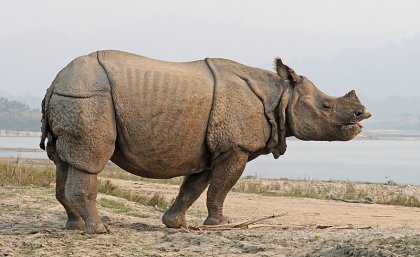Endangered mammal species are dependent on protected areas, and would likely vanish without them
Endangered mammal species are dependent on protected areas, and would likely vanish without them
Protected areas can “double” imperilled species populations

A University of Queensland-led research team has revealed that many endangered mammal species are dependent on protected areas, and would likely vanish without them.
Professor James Watson, of UQ and the Wildlife Conservation Society, said despite the success of protected areas, their popularity as a go-to conservation tool has started to wane.
“Since the 1970s, the global network of protected areas has experienced a fourfold expansion, and some of these protected sites have been crucial to protect and even enhance wildlife populations,” he said.
“However, there’s increasing debate around the role of the global protected area estate in sustaining and recovering threatened species.
“What our research has clearly shown is that protected areas, when well-funded and well-placed, are incredibly effective.
“In fact, 80 per cent of mammal species we monitored in these protected areas have at least doubled their coverage in protected areas over the last 50 years.
“And 10 per cent of the species analysed live predominantly on protected land.”
The scientists compared current distributions of 237 threatened terrestrial mammal species from the 1970s to today, measuring changes in species’ ranges, then overlaid them with the protected area network.
“A great example is the greater one-horned rhinoceros (Rhinoceros unicornis), which now has 80 per cent of its range in a protected area,” Professor Watson said.
“Their numbers have been decimated elsewhere – the species has lost more than 99 per cent of its distribution in the last 50 years.
“Now about 87 per cent of the remaining animals live in just two protected areas – Kaziranga National Park in India and Chitwan National Park in Nepal.”
Professor Watson said mammals were retreating into protected areas and more than ever, protected areas were vital to protecting the world’s biodiversity.
“There is little doubt that without protected areas we would have lost amazing species like tigers and mountain gorillas,” he said.
“This science clearly shows that to abate the extinction crisis, we need better funded and more protected areas that are well-supported and well-managed by governments and other land managers.
“At the same time, we need to reward efforts that ensure re-expansion and restoration of wildlife populations into territories beyond protected area boundaries.
“We must focus on retaining Earth’s remaining intact ecosystems that contain key protected areas and prioritise efforts to restore habitat corridors between isolated reserves, providing opportunities for movement and genetic exchange.”
The research has been published in Conservation Letters (DOI: 10.1111/conl.12748).
The team included members from UQ, the Sapienza University of Rome and the Wildlife Conservation Society.
in EcoDebate, ISSN 2446-9394, 14/09/2020
Para pesquisar mais sobre este tema ou outros, use a ferramenta de pesquisa
[CC BY-NC-SA 3.0][ O conteúdo da EcoDebate pode ser copiado, reproduzido e/ou distribuído, desde que seja dado crédito ao autor, à EcoDebate com link e, se for o caso, à fonte primária da informação ]
Inclusão na lista de distribuição do Boletim Diário da revista eletrônica EcoDebate, ISSN 2446-9394,
Caso queira ser incluído(a) na lista de distribuição de nosso boletim diário, basta enviar um email para newsletter_ecodebate+subscribe@googlegroups.com . O seu e-mail será incluído e você receberá uma mensagem solicitando que confirme a inscrição.
O EcoDebate não pratica SPAM e a exigência de confirmação do e-mail de origem visa evitar que seu e-mail seja incluído indevidamente por terceiros.
Remoção da lista de distribuição do Boletim Diário da revista eletrônica EcoDebate
Para cancelar a sua inscrição neste grupo, envie um e-mail para newsletter_ecodebate+unsubscribe@googlegroups.com ou ecodebate@ecodebate.com.br. O seu e-mail será removido e você receberá uma mensagem confirmando a remoção. Observe que a remoção é automática mas não é instantânea.